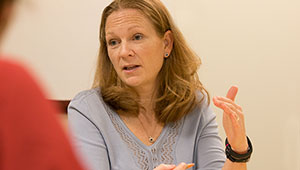A colon cancer screening program shows 5-year success

Home tests help people get recommended screening, Dr. Bev Green reports, supporting Kaiser Permanente programs that mail test kits to members
by Beverly B. Green, MD, MPH, associate investigator, Kaiser Permanente Washington Health Research Institute, and family medicine physician, Washington Permanente Medical Group
Colorectal cancer is the second-leading cause of U.S. cancer deaths, after lung cancer. Preventive screening for this cancer reduces mortality by identifying cancer early and by finding and removing precancerous growths. National and Kaiser Permanente guidelines strongly recommend screening for adults aged 50 to 75. Kaiser Permanente Washington recommends colonoscopy every 10 years or annual fecal immunochemical test (FIT), in which stool samples taken at home are mailed back to a lab.
For screening to be effective, people need to stick to the recommended schedule. Guideline-based screening is important for health care systems, too, for keeping members healthy and because programs such as Medicare track screening adherence among beneficiaries. Most people understand the importance of regular colon cancer screening but may be discouraged because they don’t know when they are due for tests or don’t want the inconvenience or discomfort of a colonoscopy.
Our Kaiser Permanente research team wants to know how best to keep people on track with their scheduled screening. In 2008, we launched the randomized controlled trial, Systems of Support to Increase Colorectal Cancer Screening. Nicknamed SOS, it compares different Kaiser Permanente Washington programs designed to help members get their scheduled screening year after year. We published our 5-year results in Cancer and are spreading the word at national meetings, including the 2017 Centers for Disease Control and Prevention (CDC) National Cancer Conference.
SOS after 5 years
Our study relied on nearly 5,000 Kaiser Permanente Washington members who were overdue for recommended colorectal cancer screening and volunteered to participate in the study. We randomly divided people into two groups:
- One received usual care. This might include receiving a FIT kit at a clinic visit or an option to choose colonoscopy, a letter at the time of their birthday about tests they need (including colon cancer screening), and sometimes, a mailed FIT kit.
- People in the other group were in a more intense automated mailed program that included annual FIT kits. They also received information on other recommended colon cancer screening tests and a number to call if they preferred colonoscopy.
We found that over the 5-year study period, people in the mailed program were up-to-date on recommended colorectal cancer screening over 30 percent more of the time than people who got usual care. FIT tests were particularly helpful in getting people to be screened. People who were sent them were 10 percent more likely to have completed at least one colon cancer screening. This is important because people who have completed no screening tests for colorectal cancer are at higher risk for not being diagnosed with the disease until after it has spread and is more difficult to treat.
Programs to mail home-test kits
Our research team has other impactful study results regarding colorectal cancer. We showed that SOS’s centralized, automated approach of mailing stool-testing kits to people who are due for screening increases screening rates, saves staff time, and is cost saving. We’ve shown that simpler, single-sample stool tests with no dietary restrictions prior to testing have advantages for getting people screened. We also found that additional help for people who do not respond to annual mailed FIT kits, such as a call from a medical assistant, boosts colon cancer screening rates even more. We also recently published findings from interviews with SOS study participants on what makes it easier or more challenging for them to complete screening.
Based on our results, we recommend mailed FIT programs to increase the number of people who get screened for colon cancer and keep to the guideline-based schedule. We’re glad that our results are having a national and regional impact. Some of our study materials and information about our results and other studies on best practices to improve colon cancer screening are publicly available for all health systems. We’re especially pleased that our results support several Kaiser Permanente regions that have a centralized program to mail FIT kits to members who need colorectal cancer screening.
Our work on this important preventive health issue continues. I’m a co-investigator on a trial to test mailed FIT kits for people who use safety-net clinics, federally qualified health centers, and Medicaid health plans in California, Oregon, and Washington. Please watch for more results to come from this work and the SOS trial.
Learn more about Kaiser Permanente Washington Health Research Institute. Sign up for our free monthly newsletter.
research into action

How to maximize screening for colon cancer?
Research informs care as Kaiser Permanente Washington, exceeding 80 percent screening rate, launches a home-based ‘FIT First’ pilot.
healthy findings blog

What to expect after a screening breast MRI vs. mammography alone
Diana Buist and BCSC find screening MRI leads to more biopsies, finding fewer cancers, regardless of personal history of breast cancer: JAMA Internal Medicine.



